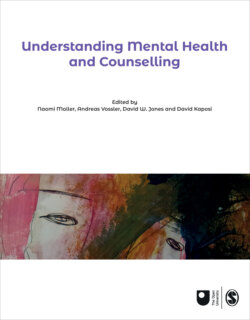Читать книгу Understanding Mental Health and Counselling - Группа авторов - Страница 28
На сайте Литреса книга снята с продажи.
3.2 Service user-led research: a voice of our own?
ОглавлениеBeing a service-user researcher is challenging. Many such researchers, like myself, favour experiential knowledge and novel ‘mad epistemologies’. Note that ‘mad studies’ and ‘mad knowledge’ are terms used to describe a key feature of the service-user movement. ‘Mad pride’ began as a way to reclaim the stigmatising identity of being labelled as a ‘mad person’. This eventually branched out into academia and has since developed into a discipline of its own. Service-user researchers tend to value lived experience over traditional academic research values such as positivism, objectivity and neutrality. This poses a threat to mainstream academia and inevitably disrupts the status quo within these settings. Due to our experiences, service-user researchers may be the first to call out oppressive and exclusionary practices, enabling the critique of dominant discourses in traditional mental health research settings (Harding, 1991). From my own experience, traditional researchers can become defensive and, in turn, service-user researchers can be labelled as ‘problematic’ or ‘subversive’.
In addition to navigating complex workplace dynamics, there are many values that service-user researchers bring into research settings that are not easily reconcilable with elitist, hierarchical, non-democratic institutions such as universities. From experience, it is evident that some service users prioritise what is best for the movement, in which case an ‘activist’ identity overrides a ‘research’ identity. This is in direct contrast to the competitive and individualistic culture fostered and perpetuated by mainstream academia. As a fellow service-user researcher wondered, how can there be any solidarity among us when it matters so much whose name is first on the next research paper? By its very nature, the research context can undermine solidarity and collective identity. Some service-user researchers (e.g. Nicki, 2016) have managed to avoid these dynamics by examining and publishing purely autobiographical accounts of their own experiences of ‘madness’ and systemic oppression.
Pause for reflection
Do you think people with lived experience should always be included in mental health research? If you have your own experiences of mental distress, how might you draw on these while doing your own research in this area?
People with mental health difficulties are frequently vocationally disadvantaged by the lack of adjustments and understanding within the workplace (Shaw Trust, 2018). As a person who experiences distress consistent with post-traumatic stress disorder, it is more acceptable for me to say that I require time off work for a physical health problem rather than because I have experienced repeated nightmares and flashbacks for the past two weeks and have reached a point of mental exhaustion. Despite the protections offered under the Equality Act 2010, people with mental health problems remain heavily stigmatised in the workplace (Walton, 2003; Sainsbury Centre for Mental Health, 2007). Many service-user researchers, like myself, work part-time or on temporary contracts. We are excluded from more stable opportunities due to stigma and the episodic nature of mental distress. Additionally, there is currently no formal career progression for a ‘service-user researcher’.
Despite the issues surrounding service-user research, the idea that ‘mad’ people could work in mental health academic contexts would have been unthinkable 30 years ago. This progress is to be celebrated. We have begun to reclaim mental health knowledge production.
We still, however, have a long way to go as Sarah Carr, a well-known service-user researcher, explains:
20 years later, does PPI merely serve to give a tokenistic competitive edge to nonuser-led academic studies, with patients and service users basically being positioned as factory hands in the psy industrial research complex? Are we marketable commodities? If so where does this leave service user and survivor researchers in academia, who want to be principal investigators, create new knowledge, have clear critical standpoints and may be grounded as activists in the service user and survivor movement? Does PPI as it is now constituted in England mean we shall always be the bridesmaid, but never the bride?
(Carr, 2019, p. 1143)
